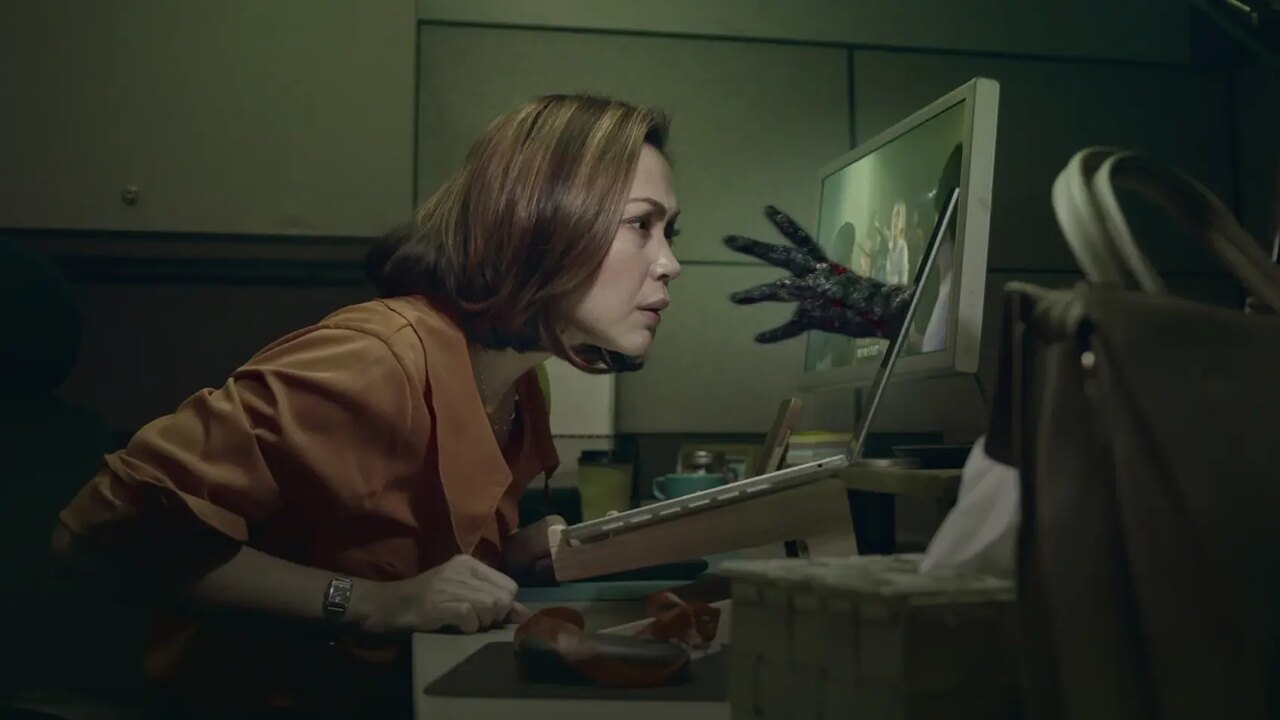
I sat down with Untold expecting a pulse-pounding dive into horror with a clever commentary on media ethics. What I got was a slow-burning psychological chill‑fest anchored by Jodi Sta. Maria’s intense turn as Vivian Vera, a journalist whose career was built on sensational exposés—most notoriously the so-called “Cement Massacre.” Now, as she revisits the story, she confronts ghostly apparitions demanding truth.
On the plus side: Sta. Maria brings gravitas and quiet determination to Vivian. She carries the emotional weight of guilt and public illusion with subtlety. When Vivian stumbles into hallucinations of victims half‑buried in concrete, those scenes linger long after they fade. The design of those apparitions—disembodied limbs, muffled screams, unmoving eyes—lands just enough eeriness without veering into cheap jump scares.
The narrative structure commits to ambiguity. You’re never entirely sure whether these hauntings are supernatural or psychological fallout. That restraint earns points: there’s no magic spell, no demon reveal—just the unrelenting consequences of manipulated truth. It aims to ask: how far does ambition blind us, and how deeply can lies embed themselves in the psyche?
Yet for all that, the movie often feels flat. The pace is glacial. For long stretches, Vivian experiences visions—but nothing changes. There’s no escalation, no deepening mystery. Her backstory stays opaque; most of her inner life remains off-screen. Empathy for her plight falters because we barely glimpse her humanity before the ghosts show up.
The film leans heavily on one big reveal in its final act—Vivian’s moral choice: confess or continue the charade. But that reckoning arrives with minimal buildup and lands with a thump rather than a gut punch. The exposition dumps in one chunk, without rising tension. It’s like someone read the script backwards and forgot the climb.
Visually, the movie leans into concrete textures and monochrome tones, gritty, muted, journalistic. That supports the mood, but the cinematography rarely surprises beyond dark corridors and flickering lights. A few scenes with a cameo of reporter Benjie (Joem Bascon) offer companionship and grounded contrast, yet they settle into bland support rather than spark into chemistry.
Even the horror elements, while thoughtfully designed, seldom provoke real fear. Dream sequences repeat similar imagery—shadows, whispers, static visions—and they grow predictable. The anticipation dies into quiet disappointment: you expect tension, but instead get tolerated monotony.
Still, it’s not without clever moments. The opening segment, where Vivian replays footage from her past reports—only to see edits she doesn’t remember—hits hard. It’s a strong visual metaphor for how reporting can warp reality. The film’s ethical angle becomes clear there: media truths are fragile, especially when ambition overtakes accuracy.
Supporting cast members like Kaori Oinuma and Lianne Valentin add fragmented glimpses of family or past colleagues, but those subplots rarely go anywhere. Gloria Diaz and Mylene Dizon show up in powerful cameo roles, anchoring scenes with the weight of elder wisdom, but they disappear as quickly as they appear.
In terms of tone, Untold tries for restrained dread, moral reckoning, and journalistic satire. Some of that land. Others feel undercooked. It so often wants to be smart—but mid-dialogue, it slips into cliché: haunted reporter driven mad, redemption arc, vengeful spirits. Yet the script resists full collapse into clichés, often by withholding emotional closure. That’s a risk—not all viewers will appreciate a film that ends with more questions than answers.
The editing by Renewin Alano and Jayvee Margaja is serviceable, though at times uneven. Some scenes drag unnecessarily, others rush with little transition. Composer Von De Guzman provides a sparse, chilling score, heavy on low piano drones and ambient hum. It suits a slow pace but never builds into memorable motifs.
Despite its flaws, the concept is sharp. A journalist haunted by her own sensationalism, who is the real ghost in this story? The victims? The lies? The ambition itself? That question hangs throughout, and when the final frames cut to black, you’re left deciding: did she confront the truth or escape it?
From a filmmaking perspective, Untold demonstrates solid ambition. It’s not a big-budget horror spectacle, but a modest psychological piece tackling public deception, guilt, and accountability. It wants to critique tabloid journalism, social ambition, and the ethics of exposure. Where it succeeds is in those rare moments when Vivian watches old video and doubts herself, when spirits trail her just out of focus, or when she walks the wreckage of her own career.
In sum, Untold earns its 60 percent. It’s thoughtful rather than thrilling, moody rather than frightening, and ethical rather than emotional. It is creative in concept, uneven in execution. Its strengths: strong lead performance, subtle visuals, and ethical questions. Its weaknesses: sluggish pacing, thin character depth, and anticlimactic resolution.
If you’re curious about a horror‑tinged meditation on media ethics, this one is worth a look. But don’t enter expecting full‑throttle horror or cinematic showmanship. Untold is a quiet ghost story for grown‑ups who wonder: can the lies you tell yourself come calling?
Final Score- [6/10]
Reviewed by - Anjali Sharma
Follow @AnjaliS54769166 on Twitter
Publisher at Midgard Times
Hi Everyone, after a due consideration, we have decided that we will be open for donations to help us in managing our website. We will be greatful for any kind of amount we receive. Thanks!
— Midgard Times 🎬 (@Moviesr_net) January 4, 2026
PayPal- [email protected] pic.twitter.com/DlNNz5Npm5
Get all latest content delivered to your email a few times a month.
Bringing Pop Culture News from Every Realm, Get All the Latest Movie, TV News, Reviews & Trailers
Got Any questions? Drop an email to [email protected]